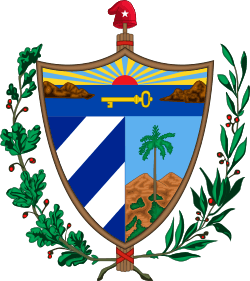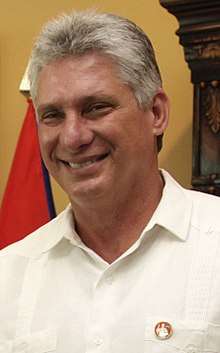Cuban parliamentary election, 2023
|
| |||||||||||||
| |||||||||||||
All 605 seats in the National Assembly of People's Power | |||||||||||||
|---|---|---|---|---|---|---|---|---|---|---|---|---|---|
| |||||||||||||
| |||||||||||||
 |
|---|
| This article is part of a series on the politics and government of Cuba |
|
|
Executive |
|
Judiciary
|
|
Parliamentary elections are scheduled to be held in Cuba in 2023 to elect members of the National Assembly of People's Power. They will be the first elections since 1976 that neither Fidel or Raúl Castro are involved.[1]
Background
In the 2018 parliamentary elections 80% of voters voted for the full list and 20% for only selected candidates.[2]
Electoral system
All Cuban citizens who are over the age of 18 years, and process full political rights for at least five years prior to the election are eligible to partake within the election.[3] 50% of candidates must be nominated by people from the municipality and elected by direct vote in local assemblies, where people decide who they consider to have the qualities to best represent them.[4] The other 50% of candidates are proposed by nominating assemblies which comprise representatives of workers, youth, women, students and farmers as well as members of the Committees for the Defense of the Revolution.[3] The final list of candidates, which corresponds to the number of seats to be filled, is drawn up by the National Candidature Commission taking into account criteria such as candidates' merit, patriotism, ethical values and revolutionary history.[3]
Voter requirements are set within article 132 of the Cuban constitution. All voters must be Cuban citizens who have reached the age of 16 years who have not be declared mentally disabled by a court as well as the individual must not have committed a crime.[5] The electoral system is designed to give the winner of the election a majority. To be declared elected, one candidate must obtain more than 50% of the valid votes cast in the constituency in which they are running. If this is not attained, the seat in question remains vacant unless the Council of State decides to hold a second round of voting.[3]
References
- ↑ "Cuba bids goodbye to the revolutionary generation". The Economist. Retrieved 2018-04-13.
- ↑ El voto de Cuba socialista Granma, 19 March 2018
- 1 2 3 4 Union, Inter-Parliamentary. "IPU PARLINE database: CUBA (Asamblea nacional del Poder popular), Electoral system". archive.ipu.org. Retrieved 2018-04-13.
- ↑ cg-RT, teleSUR /. "This is How Cubans Run, Campaign and Vote in Elections". Retrieved 2018-04-13.
- ↑ "Cuban Constitution" (PDF).
